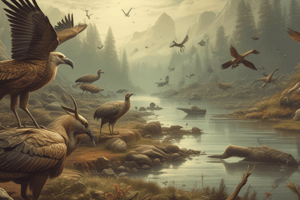Podcast
Questions and Answers
What is the main purpose of scavengers, detritivores, and decomposers?
What is the main purpose of scavengers, detritivores, and decomposers?
- To recycle nutrients back to the ecosystem (correct)
- To compete with other organisms
- To create waste
- To generate energy
What do scavengers feed on?
What do scavengers feed on?
Dead and decaying organisms
Give examples of scavengers.
Give examples of scavengers.
Hyenas, raccoons, coyotes, vultures, etc.
Vultures have feathers on their heads.
Vultures have feathers on their heads.
What are detritivores?
What are detritivores?
What role do decomposers play in the ecosystem?
What role do decomposers play in the ecosystem?
Can fungi decompose wood?
Can fungi decompose wood?
What distinguishes decomposers from scavengers and detritivores?
What distinguishes decomposers from scavengers and detritivores?
Fungi are __________ and fascinating.
Fungi are __________ and fascinating.
Organisms adapt as scavengers and detritivores require more energy to survive.
Organisms adapt as scavengers and detritivores require more energy to survive.
Study Notes
Importance of Scavengers, Detritivores, and Decomposers
- Crucial for recycling nutrients back into the ecosystem.
- Help maintain cleanliness by removing dead organisms and waste.
- High nutrient content in once-living tissues must be utilized to prevent wastage.
Scavengers
- Feed on dead or decaying organisms, not limited to carrion.
- Generally larger animals; evolved to digest rotting flesh.
- Can include hunters that scavenge when finding dead animals.
Examples of Scavengers
- Common scavengers: hyenas, raccoons, coyotes, wolves, sharks, vultures, bears, lions, rats, skunks.
Vultures
- Distinctive feature: featherless heads for easy access to decaying flesh, preventing feather contamination.
- Possess strong sense of smell and sight to locate carrion.
Detritivores
- Smaller organisms that consume detritus, including dead matter and feces.
- Clean up remains after scavengers have fed; consume smaller leftovers.
Examples of Detritivores
- Notable detritivores: earthworms, mites, snails, shrimp, crabs, slugs, beetles, flies, maggots.
Scavengers vs. Detritivores
- Both play roles in consuming decaying matter, but scavengers consume larger amounts.
Decomposers
- Break down materials that scavengers and detritivores cannot, making nutrients available to primary producers.
- Essential for recycling nutrients within ecosystems.
Decomposing Process
- Organic material is broken down into carbon dioxide, water, nitrogen, phosphorus, and calcium.
Examples of Decomposers
- Decomposers can be small: protozoa, bacteria, microorganisms.
- Larger decomposers include fungi.
Fungi and Decomposition
- Fungi are heterotrophs that play a significant role in decomposition.
- Capable of breaking down lignin, a complex substance in wood that most other organisms cannot.
Nutrient Absorption in Organisms
- Detritivores and scavengers digest internally; decomposers absorb nutrients externally through chemical processes.
- Decomposers utilize a method known as absorptive nutrition to digest detritus into simpler molecules for absorption.
Adaptation of Organisms
- Adaptation towards reduced energy expenditure by avoiding hunting; emphasis on scavenging and decomposition for survival.
Studying That Suits You
Use AI to generate personalized quizzes and flashcards to suit your learning preferences.
Description
Explore the critical roles that scavengers, detritivores, and decomposers play in our ecosystem. This quiz delves into how these organisms recycle nutrients and manage waste, helping maintain ecological balance. Test your understanding of these essential organisms and their functions.




